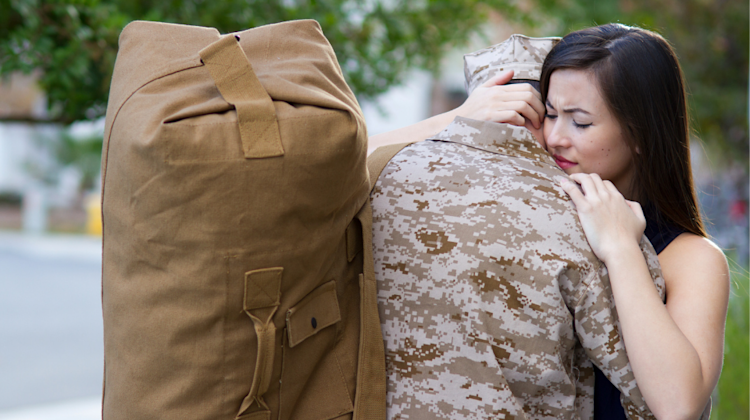Unaccompanied Orders: BAH, Entitlements, and Family Options
by Rebecca Alwine - March 16th, 2022

“Honey, I have news,” is how the conversation always starts. But what happens when that news of a military move involves an unaccompanied tour? Across military branches, service members receive unaccompanied orders to Korea, Japan, Guam, and the Middle East, among other locations.
If you or your spouse recently received unaccompanied orders, you have a few options, including joining your spouse on their unaccompanied tour. However, this isn't always a possibility, and some spouses simply choose not to join the service member.
What are your options when your spouse receives unaccompanied orders? And what's the best decision for military families?
What are my options?
If the spouse cannot or chooses not to join the service member, things get a little tricky. The spouse left behind has several options.
Stay in place
Your first option is to stay in your current location. Families choose this route for a variety of reasons:
Continuity for children, especially older children who may be close to graduation
Career continuity for the military spouse
Access to needed medical services
A strong network of support, including friends, family, and faith communities
Move back home
The second option if not joining the active duty spouse on an unaccompanied tour is to move back to a designated location, usually your home of record. In this instance, the military would pay for the spouse and dependents to move to their desired location.
Military spouse Tracy went home to West Virginia when her husband got year-long unaccompanied orders to Kuwait. “We were stationed in New Jersey at the time and would not be returning to that duty station, so it did not make sense to stay,” she recalled. “It is hard to be in my hometown surrounded by people with no clue what military family life is like, but it was great that my kids were able to build strong bonds with their grandparents, aunts, uncles, and cousins.”
If you need to sell your home, or search for housing at your next location, you can connect with a military-friendly real estate agent here.
PCS to the next location
Another choice is to PCS to the next duty station (if known). With this option, the military would arrange and pay for the spouses and dependents to move to the follow on location.
(Side note: you can read trusted reviews about your next duty station here, written by families just like yours).
This option allows families to get set up in their new location before the service member completes the unaccompanied tour. Families might also consider this option if the next duty station is in a desirable location, has access to better services, or is close to family and friends.
Amanda and Crystal are two military spouses who chose this option. Amanda moved ahead while her husband was in Korea because that would put her and the kids closer to family. It was fortunate as she needed some help when medical problems arose.
When Crystal’s husband went to school for nine months, she also moved ahead to their next duty station. “He was gone for about nine months and then he signed into Ft. Bragg and deployed for a year.” She says, “I’m glad we moved ahead to get settled into our groove instead of postponing the inevitable.”
BAH for unaccompanied moves
The question of how basic allowance for housing (BAH) works with unaccompanied orders is a common one. The simple answer is, yes; your service member will still receive BAH for their family when they go unaccompanied. The more complicated answer is how the amount is calculated.
If the dependents stay in the same location, BAH will remain at the same rate.
Moving from your current location back "home" works a little differently. In that instance, BAH is based on the home of record, or the location to which the dependents move. Tracy, who decided to move from their current location in New Jersey to her hometown in West Virginia, received BAH based on their actual location (West Virginia).
Similarly, if dependents move to the next duty station, BAH is calculated for that specific location. Click here to find the BAH rates for your area.
It's important to note that moves are not authorized during a deployment. For instance, when Mindy moved from North Carolina to Texas after falling ill, she ended up living with her parents for 15 months during a deployment. “We had to keep our apartment in North Carolina, and I went back about two weeks before he got home to get settled in,” she remembered. Since a deployment does not authorize moving home, the BAH would be for the duty station where the service member is stationed (North Carolina in this case), no matter where the family lives during that time.
Should I stay or should I go now?
This decision is not an easy one. There is no right or wrong answer. Of course, whatever you and your spouse decide comes with military rules and regulations.
If you ask a hundred military families what they would do if faced with this situation, you’d probably get an even split. One-third would stay behind, where they already have an established support system, a house, and friends. This choice is especially prevalent when a service member is returning to the same place, since the military won’t always pay for the family to move when the stateside duty station remains the same.
Another third would PCS to the next place, get settled, and keep on living. “After living this life for 17 years and having school-aged kids, I think it’s easier just to get the girls settled into their new schools and save them from any further moves,” Crystal explained.
The final third would move back home to live with or be close to their family. Living close to extended family is something that happens so rarely, it’s hard to turn it down. Karin moved home when her husband received unaccompanied orders to Korea, “I moved back home and rented a house near my parents and in-laws. The boys were 3, 3, and 8.”
Moving with unaccompanied orders
Some spouses choose to join the service member on the unaccompanied tour if the military will allow families to join. If this is your plan, you should know that there will be added expenses and challenges.
Unlike a standard OCONUS PCS, the service member's dependents will not receive command sponsorship. That means no financial help with the move, little or no access to the base once you arrive, and limited services for the dependents. Unaccompanied orders mean you will likely pay out of pocket for housing, school services, and medical treatments.
Because the service member has unaccompanied orders, the spouse and dependents might not have permission to live in the host country. You'll need to research visa requirements for the location and have a plan to keep your visa status current.
Read more about command sponsorship and unaccompanied orders here.
It's a personal decision
No one can answer this question for you. The decision has to be made with your family’s best interest in mind. Sometimes that means living near the best schools for the kids. Living close to family is often a huge help to the parent staying behind. And sometimes the security of living on base puts the service member at ease, so that becomes the best option.
Whatever you decide, know that there is a wealth of information and a vast support system within the military community just waiting for you with open arms.








